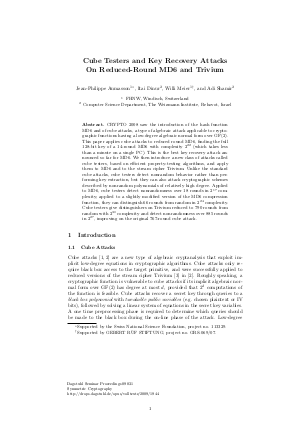Cube Testers and Key Recovery Attacks On Reduced-Round MD6 and Trivium
Authors Jean-Philippe Aumasson, Itai Dinur, Willi Meier, Adi Shamir
-
Part of:
Volume:
Dagstuhl Seminar Proceedings, Volume 9031
Part of: Series: Dagstuhl Seminar Proceedings (DagSemProc) - License:
 Creative Commons Attribution 4.0 International license
Creative Commons Attribution 4.0 International license
- Publication Date: 2009-03-30
File

PDF
DagSemProc.09031.6.pdf
- Filesize: 197 kB
- 22 pages
Document Identifiers
Subject Classification
Keywords
- Cube attacks
- property testing
- MD6
- Trivium
Metrics
- Access Statistics
-
Total Accesses (updated on a weekly basis)
0Document
0Metadata
Abstract
CRYPTO 2008 saw the introduction of the hash function MD6 and of cube attacks, a type of algebraic attack applicable to cryptographic functions having a low-degree algebraic normal form over GF(2). This paper applies cube attacks to reduced round MD6, finding the full 128-bit key of a 14-round MD6 with complexity 2\^22 (which takes less than a minute on a single PC). This is the best key recovery attack announced so far for MD6. We then introduce a new class of attacks called cube testers, based on efficient property-testing algorithms, and apply them to MD6 and to the stream cipher Trivium. Unlike the standard cube attacks, cube testers detect nonrandom behavior rather than performing key extraction, but they can also attack cryptographic schemes described by nonrandom polynomials of relatively high degree. Applied to MD6, cube testers detect nonrandomness over 18 rounds in 2\^17 complexity; applied to a slightly modified version of the MD6 compression function, they can distinguish 66 rounds from random in 2\^24 complexity. Cube testers give distinguishers on Trivium reduced to 790 rounds from random with 2^30 complexity and detect nonrandomness over 885 rounds in 2\^27, improving on the original 767-round cube attack.
Cite As Get BibTex
Jean-Philippe Aumasson, Itai Dinur, Willi Meier, and Adi Shamir. Cube Testers and Key Recovery Attacks On Reduced-Round MD6 and Trivium. In Symmetric Cryptography. Dagstuhl Seminar Proceedings, Volume 9031, pp. 1-22, Schloss Dagstuhl – Leibniz-Zentrum für Informatik (2009)
https://doi.org/10.4230/DagSemProc.09031.6
BibTex
@InProceedings{aumasson_et_al:DagSemProc.09031.6,
author = {Aumasson, Jean-Philippe and Dinur, Itai and Meier, Willi and Shamir, Adi},
title = {{Cube Testers and Key Recovery Attacks On Reduced-Round MD6 and Trivium}},
booktitle = {Symmetric Cryptography},
pages = {1--22},
series = {Dagstuhl Seminar Proceedings (DagSemProc)},
ISSN = {1862-4405},
year = {2009},
volume = {9031},
editor = {Helena Handschuh and Stefan Lucks and Bart Preneel and Phillip Rogaway},
publisher = {Schloss Dagstuhl -- Leibniz-Zentrum f{\"u}r Informatik},
address = {Dagstuhl, Germany},
URL = {https://drops.dagstuhl.de/entities/document/10.4230/DagSemProc.09031.6},
URN = {urn:nbn:de:0030-drops-19443},
doi = {10.4230/DagSemProc.09031.6},
annote = {Keywords: Cube attacks, property testing, MD6, Trivium}
}
